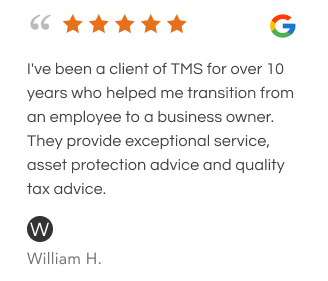Building and protecting your wealth requires careful planning and smart strategies to keep your assets safe. At TMS Financials, we focus on asset protection, making sure both your personal and business assets are secure from unexpected legal issues. One effective method we use is setting up your business as a limited liability company, which reduces your personal risk for business debts.
Work with us to design an asset protection plan that matches your financial needs and business operations. Our tailored strategies help guard your assets against potential risks and liabilities, ensuring your peace of mind.
Reach out to TMS Financials today to safeguard your business and personal wealth.
Protect your assets with TMS Financials
Tailored asset protection strategies
Comprehensive risk management for business owners
Effective succession and transfer planning
Protect your assets with TMS Financials
We’re an Australian tax accounting firm with 30+ years of experience serving business owners and investors. Our reputation for reliability and exceptional client service is built on providing accurate financial advice and asset protection. We remain committed to serving our clients with integrity, professionalism, and quality, and have the expertise to help you succeed.
TMS Financials is online now

INDUSTRY ASSOCIATIONS
TMS Financials is a proud member of the following


Eng Sivieng
Principal of TMS Financials
We strive to build long-term relationships with our clients and to be a trusted advisor for all their financial needs.
Why property investors should consider asset protection strategies to protect against risk
Investing in property can enhance your wealth significantly, but it also exposes you to potential risks if you don’t implement effective asset protection strategies. Real estate involves fixed costs, like stamp duty and legal fees, and unlike more liquid assets such as stocks or cash, properties cannot be quickly sold or exchanged when you need funds urgently.
In Australia, property ownership is highly transparent due to the ‘Torrens Title’ system. Each property has a unique number and is registered with state land titles offices, such as the NSW Land Registry Services. This transparency makes it easier for creditors to identify property owners and target their equity during financial downturns. For example, creditors might place caveats on property titles to secure debts, placing your investments at risk.
To shield your investments from these risks, consider setting up a private company or a family trust, creating a limited liability structure, or keeping your business and personal assets separate. These strategies can safeguard your investments from legal and financial threats, helping to preserve your wealth and ensure financial stability.
Basic asset protection for personal and business security
Extended liability insurance
Managing separate accounts
Forming a business entity
Setting up an asset protection trust
Types of Trusts for Effective Asset Protection
Here are some important types of trusts that provide varying levels of asset protection:
Discretionary Trusts or Family Trusts
A Discretionary Trust, also known as a Family Trust, allows the trustee the flexibility to decide how the assets are distributed among the beneficiaries. These trusts are commonly used to protect family assets and plan for future generations, and they offer tax planning benefits as well. Family trusts are eligible for the 50% Capital Gains Tax (CGT) General Discount, though they do not allow for tax offsets from negatively geared assets.
If you are interested in setting up a family trust, visit our page here for more information.
Unit Trusts
Unit trusts divide the trust’s assets into units that are owned in specific percentages, similar to share ownership in a company. This structure is beneficial for joint investment ventures. For detailed information on unit trusts, you can read our guide, Understanding Unit Trusts here.
Hybrid Trusts
Testamentary trusts
Trusts and tax obligations
While trusts can be effective vehicles for protecting assets, they also come with certain limitations. For example, discretionary trusts cannot apply tax credits for losses on negatively geared assets. Also, there are specific considerations for land tax, such as the lack of a land tax threshold in New South Wales and a relatively low threshold in Victoria.
Strategies for protecting investment properties and assets
When transferring personal assets to a trust, the assets typically must be sold to the trust, which can lead to considerable costs. For example, if the sale results in a profit, you will likely need to pay tax on those capital gains. Moreover, transferring property ownership can incur stamp duty fees, which can be substantial.
Another important factor is the refinancing of any debts tied to the assets. As the legal ownership transitions to the trust, any existing debts secured against these assets might require refinancing. In a tighter lending environment, it can be difficult to secure advantageous refinancing terms.
For more information on asset protection and how using a trust, such as a unit trust or a discretionary trust, can help secure your investment properties and assets, contact us today to schedule a complimentary consultation.
FAQs on Asset Protection
Is owning property in my own name a safe asset protection strategy?
Does transferring property to my spouse or partner provide secure asset protection?
Is a company structure a reliable way to protect my property investments?
Using a company structure to hold assets might seem secure, but it can come with significant limitations. As a shareholder, if the company faces legal challenges, both your shares and the underlying assets could be at risk. Moreover, properties owned through companies do not qualify for the 50% Capital Gains Tax (CGT) discount and offer limited flexibility in managing earnings or losses from negative gearing.
How effective is a trust in protecting property investments?
Holding properties in a trust can provide strong protection. In this arrangement, the trust—not the individual—owns the assets, which shields them from personal legal challenges. Trusts can be managed by an individual or a corporate trustee and offer flexibility in allocating income or losses to various beneficiaries, thereby enhancing asset protection and financial management options.
What is the difference between safe and dangerous assets?
Next step is to contact TMS Financials
TMS Financials provides you with a team of experienced professionals that help you achieve your financial goals through smart tax structures and strategic structuring.
Book a financial health review to see the difference we can make in your financial future.
Disclaimer
Contact us today for a consultation.
Contact us today to learn more about how our accounting services can benefit your business. We look forward to hearing from you and helping you achieve financial success!
